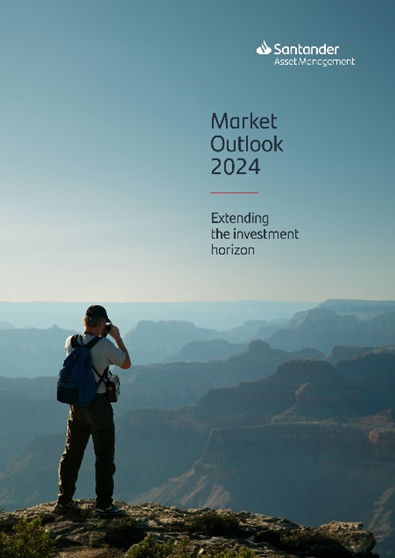Q4 2023
This publication aims to provide an insight into the changing economic environment and importantly, how this has impacted financial markets and investments. Our Multi-Asset Solutions team at Santander Asset Management UK share their thoughts on the market outlook and how they have adapted investment portfolios to position our clients for the road ahead.
Market Outlook 2024
Santander Asset Management has recently released the global investment outlook for 2024.
In this edition of the Quarterly Perspectives, our Mult-Asset Solutions team takes a look at the key takeaways from the report.
If you would like to read the full, in-depth analysis, please visit our website at: santanderassetmanagement.co.uk/retail-investor/markets-insights/market-updates

Inflation and interest rates - Interest rates expected to fall in 2024
There has been a shift in the market consensus from expecting a recession to foreseeing a ‘soft landing’ – a slowdown in economic growth that avoids recession, despite high interest rates. The impact of the steepest interest rate hike cycle in decades has been more muted than expected, with the market now believing that many economies can navigate the impact of high interest rates without a major crash.
Compared to previous interest rate hike cycles, the economic slowdown has been delayed. High interest rates will eventually lead to a slowdown in growth, which ultimately should lead to a fall in interest rates this year. This delayed economic slowdown is seen as a significant factor in the market's shift from anticipating a recession to expecting a ‘soft landing’.
Furthermore, the resilience of growth is underpinned by a strong labour market and healthy company finances in the private sector. While a recession similar to past interest rate hike cycles is unlikely, the future environment will be one of low growth as long as financial conditions remain restrictive, as high interest rates make borrowing money more expensive for businesses.
Markets believe that interest rates have now peaked, with the Bank of England (BoE), Federal Reserve (Fed) and European Central Bank (ECB) pressing pause on interest rate hikes during their recent meetings. They are moving from wondering ‘how high’ to raise rates to questioning ‘how long’ to keep them high.
In terms of inflation, real wage growth continues to remain at high levels and is likely to support a higher inflation rate. In both Europe and the United States, the unemployment rate is slightly above its lowest levels in recent decades, which is driving demand for wage increases. This means that the BoE, Fed, and the ECB could continue to favour a policy of high interest rates for longer to allow the delayed impact of rate hikes to be reflected in the economy and help bring inflation down. We believe that inflation is likely to continue to ease throughout 2024 but remain at high levels compared to the BoE, Fed and ECB targets of 2%.
The Fed has indicated that inflation in the US is easing and three 0.25% rate cuts are coming in 2024, however, inflation in the UK has not come down as quickly, with the BoE noting that interest rates could be higher for ‘an extended period of time’.1
Headline inflation and official interest rates
Shares - Long-term view
Global financial markets withstood the gloomy expectations in 2023. Shares rallied, with many major share indices recording double-digit gains during the year, helped by a strong rally in November and December as falling inflation made traders more hopeful of interest rate cuts in 2024.2
Going forward, we believe there are opportunities to invest in sectors and regions where valuation levels already reflect an adverse economic growth scenario. The risk-return profile of shares is less attractive than that of bonds in the short-term and company earnings may disappoint in 2024. However, our view of shares is positive over the long-term.
The energy transition, artificial intelligence revolution, and supply chain realignment require a historic level of investment. We expect to see themes linked to machine learning, renewable energies, and robotics, among others, growing their representation in portfolios to capture long-term growth opportunities. We believe these trends could deliver investment growth in the medium to long-term, as there is likely to be an acceleration in their development and implementation in the next decade.
Bonds – back in 2024
As interest rates have risen to combat inflation, investors have flocked towards government and corporate bonds, boosting prices later in 2023.3
We believe that bonds offer attractive investment opportunities in the current economic environment. The bond market is offering attractive yields relative to historical levels in virtually all segments and geographies. The current levels of investment-grade corporate bond yields are attractive and the quality of company finances in most sectors can withstand an economic slowdown. For the first time in many years, investment-grade bonds offer yields that are competitive with shares.
At present, lower risk bonds (government and high-quality corporate bonds) offer the best risk/return trade-off. There is a higher likelihood that interest rates have peaked, so we have higher duration in our portfolios than usual, as this has historically generated value in the period following the peak of rate hikes. We believe that longer-duration bonds provide greater resilience to our portfolios, offering attractive yields today that can be locked in over a longer time horizon and the potential benefit of price appreciation in a recession. Long-term government bonds are now attractive, with significant upside potential and limited downside.
Investment-grade bonds: Issued by companies considered most financially secure and least likely to default on their loans.
Bond duration: Generally, the higher a bond’s duration, the more its value will increase as interest rates fall, because when rates go down, bond values rise and vice versa.
Baffled by bonds?
It may be worth taking some time to learn the basics to help you better understand how they work.
Visit our Basics on Bonds page for more information.

Our tactical asset allocation
Our tactical asset allocation represents our views on the financial markets based on the current market conditions and our own market outlook over the coming months. The below chart demonstrates how our current positioning is either underweight, overweight or neutral when compared to a funds benchmark. Generally, an underweight position means that we think a sector will perform worse than others, so we hold less of it. Holding an overweight position means that we think a sector will perform better, so we hold more of it. A Neutral position means that we think a sector will perform similarly to others, so we will hold a similar amount as the benchmark.
Summary
- We believe that interest rates will fall gradually throughout 2024.
- Economic growth will be slow due to the impacts of interest rate rises, but most economies should avoid a recession.
- Inflation will continue to ease throughout 2024, however, a strong labour market means that this decline will be more gradual.
- We believe that bonds offer attractive investment opportunities in the current economic environment.
- We have a positive view of shares over the long-term.

Learn more, visit our website here for more insights into financial markets.
Note: Data as at 31 December 2023. 1Investors Chronicle, 14 December 2023. 2The Guardian, 31 December 2023. 3Reuters, 29 December 2023.
Important information
For retail distribution.
This document has been approved and issued by Santander Asset Management UK Limited.
This document is for information purposes only and does not constitute an offer or solicitation to buy or sell any securities or other financial instruments, or to provide investment advice or services. Opinions expressed within this document, if any, are current opinions as of the date stated and do not constitute investment or any other advice;
the views are subject to change and do not necessarily reflect the views of Santander Asset Management as a whole or any part thereof. While we try and take every care over the information in this document, we cannot accept any responsibility for mistakes and missing information that may be presented.
The value of investments and any income is not guaranteed and can go down as well as up and may be affected by exchange rate fluctuations. This means that an investor may not get back the amount invested. Past performance is not a guide to future performance.
All information is sourced, issued and approved by Santander Asset Management UK Limited (Company Registration No. SC106669). Registered in Scotland at 287 St Vincent Street, Glasgow G2 5NB, United Kingdom. Authorised and regulated by the Financial Conduct Authority (FCA). FCA registered number 122491. You can check this on the Financial Services Register by visiting the FCA’s websitewww.fca.org.uk/register.
Santander and the flame logo are registered trademarks. www.santanderassetmanagement.co.uk


